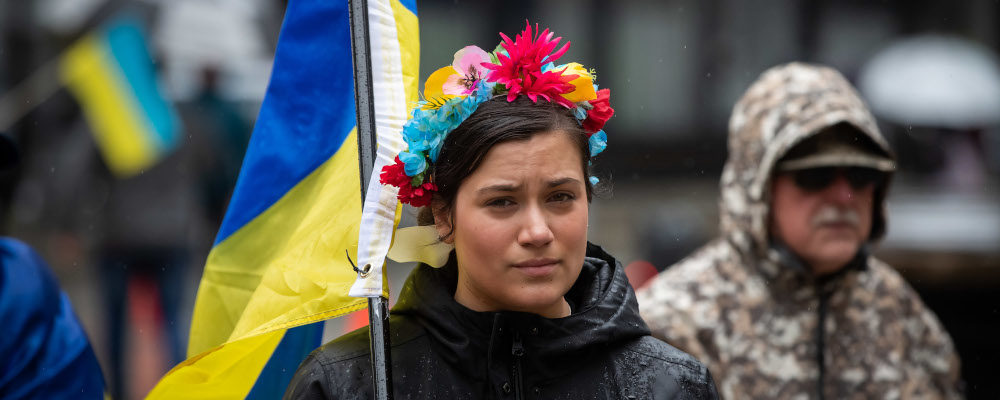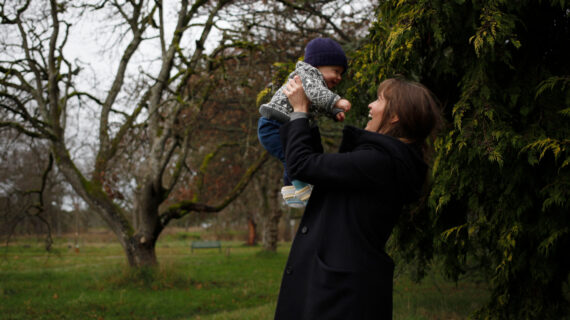The ongoing Ukrainian resistance (and global support thereof) against Russian imperialism offers us a contemporary example of how nationalism can be used as a positive force for social good. Indeed, we need now more than ever to reclaim “nationalism”—both rhetorically and conceptually—from imperialists, insurrectionists, and other nefarious political actors.
For months now, we have witnessed nationalism being used to rally support across the world for Ukrainian resistance against an unpopular show of Russian imperialism. Both within Ukraine and abroad, the blue and yellow of Ukraine’s flag have been flaunted throughout public and private spaces as a sign of solidarity. Ukrainian-born boxers Oleksandr Usyk, Vasiliy Lomachenko, and brothers Vitali and Wladimir Klitschko have all returned home to defend their country against invading forces. Here in Canada, the Canadian-Ukrainian gypsy punk band Lemon Bucket Orchestra has organized a number of events to raise funds in support of Ukrainian resistance. Almost overnight, Ukrainian president Volodymyr Zelenskyy has become a ubiquitous symbol of what competent, national resistance can look like in the face of aggressive expansionism.
The prevailing narrative is that Putin assumed his invasion of Ukraine would be a straightforward military operation, met with little or no real resistance. What Putin almost certainly didn’t account for, however, was the resolve of the Ukrainian people. While it is legitimate to say that other states might have done more (and indeed, can do more still) to support Ukraine in their efforts to fend off Russian aggressors, the same cannot be said of Ukrainians themselves. Millions of people (mostly women and children) have now fled Ukraine. Yet an incredible number of people have stayed to fight tooth and nail against Putin’s army, and thousands more (including many Canadians) have willingly travelled to the active war zone to defend Ukraine out of a sense of national duty.1“The 550 would-be fighters that have arrived from Canada so far are part of a battalion based in Kyiv, said the representative of the International Legion for the Territorial Defence of Ukraine, who asked not to be identified for security reasons.” https://nationalpost.com/news/world/exclusive-so-many-canadian-fighters-in-ukraine-they-have-their-own-battalion-source-says
We need to recognize and name this ongoing phenomenon as Ukrainian nationalism. Nationalism can be negative and used as a weapon against the “Other”, but it can also be a positive tool to help resist imperialism, as well as foster social cohesion and civility during times of peace. In recent decades, many young progressives have become critical of anything that smells nationalistic. Nationalism, after all, has been blamed for giving us Brexit, Trump, and an unravelling liberal world order. But as someone who self-identifies as (relatively) young and (typically) progressive, I feel compelled to warn others that we demonize nationalism, writ large, at our own peril. Nationalism is purely emotional and ultimately unavoidable—national symbols and sentiments will always be used to rally people around causes. Indeed, the ongoing Ukrainian resistance (and the ideologically diverse support thereof) offers us a chance to rethink what nationalism means, as well as how we can harness it for positive social purposes. If we fail to do so, and continue to write off nationalism as inherently problematic or always wicked, then we cede an incredibly powerful political tool to some very dangerous groups.
Generally speaking, our sense of national identity is really just our subjective/affective self-identification with a given nation. This includes the ways in which we adopt customs, abide by or engage with traditions, recognize and understand national symbols, and venerate or appreciate national heroes or important figures (whether real or imaginary). In this sense, national identity differs from the formal, legal citizenship that we might enjoy. And like all identities, national identities can be activated at different times, by different actors, and for different political purposes.
This basic understanding of national identity then brings us to nationalism, which is an ideological orientation characterized by an intense identification with one’s nation and sense of national identity. Over the last decade or so, nationalism has once again become something of a dirty word in political discourses, largely due to the recent rise in national populist movements throughout the world and the (re)emergence of overt white nationalism in places like the US. But nationalism can actually manifest itself in many different ways. Sometimes, as in cases of white nationalism or national populism, nationalism can be problematic or even dangerous—what John Ralston Saul called “negative nationalism”.2The Collapse of Globalism and the Reinvention of the World In most cases, negative nationalism involves casual xenophobia or jingoism—the “Othering” and mistrust of outsiders. This is the sort of nationalism espoused by Don Cherry for decades on Coach’s Corner. In extreme cases, however, negative nationalism can sometimes result in violence—whether in individual, isolated events, or larger scale conflicts like war and genocide. In a more conceptual sense, nationalism can also be negative when it is arbitrary. For example, when national identities and a sense of nationalism are evoked in order to justify otherwise irrelevant policies or practices (like in cases of blaming immigrants for economic issues). This sort of nationalism can cloud peoples’ minds with emotional thinking and prevent people from thinking, behaving, or voting rationally.
Unfortunately, the negative manifestations of nationalism tend to be the ones we talk about and focus on in contemporary political discourses. But nationalism can also be more benign or even a constructive force for social good. An example of benign nationalism would be the 1994 National Sports of Canada Act.3National Sports of Canada Act This Act contains only two clauses: the first states that the official winter sport of Canada is ice hockey, and the second states that the official summer sport of Canada is lacrosse—that’s it! This policy doesn’t really do anything (good or bad) for Canadian society, it’s really just a nationalistic and symbolic move to showcase that Canadians, generally, take pride in the cultural significance and traditions of these two sports. Even though the Act doesn’t really do anything in practice, it’s still a textbook case of nationalism—albeit a benign one.
But nationalism can also be a constructive force for social good—what John Ralston Saul called “positive nationalism”. As political commentator David Frum has pointed out, whenever natural disasters occur in any part of Canada (like wildfires out west, or floods in the Ottawa Valley), nationalism can be used to help mobilize support and raise funds to help those in need. When serious wildfires were ravaging Alberta a couple of years ago, people from all over Canada donated money and volunteered their time to help with disaster relief for those in need. A big reason they did so was because of some sense of nationalism—they felt connected to their fellow Canadians. Realistically, it would make much more sense for someone from, say, Seattle to care about and want to help people suffering from wildfires in Alberta than it would for someone from New Brunswick or PEI to want to do so, given Seattle’s relative geographic proximity to Alberta. And yet, people from New Brunswick and PEI were much more likely to help their fellow Canadians during these times—an undeniably positive manifestation of nationalism.4Two P.E.I. firefighters sent to help control wildfires in Alberta after record-breaking heatwave This is exactly the sort of positive nationalism we are currently seeing through global solidarity with Ukraine.
Another way in which nationalism can be used for social good is by helping to overcome social or political cleavages. If Canadians become too politically divided along lines of class, wealth, education, geography, language, ethnicity, religion, or any other social identity, they can still be made to recognize each other as fellow Canadians and potentially quell any rising tensions or social unrest. Historically, this has been the case—people might not like a particular politician, political party, premier, or prime minister, but they still tend to respect these people’s commitments to Canadian society—even if they disagree on particular policies or perspectives. We can (and should) still work towards resolving other political divisions based on class, race, gender, etc., but a baseline sense of nationalism can ensure that these divisions don’t threaten the stability of our society in the short run.
With rising populism though, particularly in the age of social media and outrage politics, we’re increasingly seeing people abandon these sorts of mutual respect and civility for each other as members of the same nation.5“According to polling conducted by Public Square and Maru/Blue and exclusively provided to The Hub, 77 percent of Canadians polled either somewhat or strongly agree that they are angry. Seventy-three percent of respondents strongly agree that ‘society is coming apart.’ https://thehub.ca/2021-04-12/canadians-are-angry-so-what-can-we-do-about-it/
For example, the January 6th insurrection in the U.S. represented a large group of people who no longer respect or trust their fellow Americans. And similarly so, albeit to a much less severe degree, here in Canada—the increasingly hostile rhetoric of people who claim that Justin Trudeau is a traitor to Canada or that he should be arrested for treason represents a breakdown of our shared national identity and political commitments to treating each other with civility and mutual respect—even if you disagree with the prime minister. Indeed, while the so-called “Freedom Convoy” protesters throughout the country waived Canadian flags and appropriated other national symbols, there is a certain irony in the fact that the actions and rhetorics of these individuals actually stand in stark contrast to our traditional, positive nationalist understanding of Canada as a place of “Peace, Order, and Good Governance”.
During the outset of the “Freedom Convoy” occupation in Ottawa, many were outraged at images of a Terry Fox statue holding protest signs. Certainly, there is an argument to be made that some statues (particularly of colonial figures) deserve to be defaced or even torn down. But we also cannot throw the proverbial baby out with the bathwater—we need to recognize the civic value of shared national symbols as a matter of democratic preservation. If you found yourself saddened by the political use of the Terry Fox statue, you were experiencing a nationalist sentiment. Toppling colonial statues might sometimes be justified (although there are certainly people who disagree on this point6Rudyard Griffiths: Instead of reconciliation, we are busy with pointless acts of retribution), but we need to tread lightly and make sure we aren’t moving away from a constructively critical view of national symbols toward a categorically hostile view of national symbols. In other words, we can certainly find space to reflect critically on the merits and problems of nationalism in Canada, but we need to do so with the understanding that nationalist sentiments should be improved upon rather than overcome altogether.
I want to end by saying that I sincerely hope the people of Ukraine are successful in resisting Putin’s egotistical aggression, and that their eventual success presents us all with a re-imagining of what positive nationalism can mean.
Slava Ukraini. Heroyam Slava.




